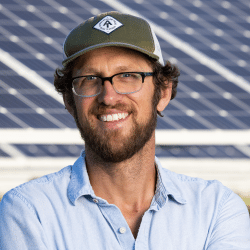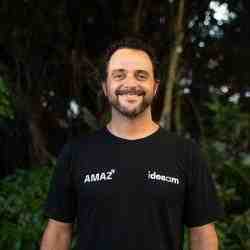Introduction
Douglas McMeekin has developed a rural education model that integrates academic study with practical experience in microenterprise so that students are prepared to resolve the social, economic, and environmental challenges in the Ecuadorian Amazon. Poor, primarily indigenous students acquire the necessary skills at Yachana to promote entrepreneurship, conservation, and sustainable development in their communities.
The New Idea
Douglas founded the Yachana Foundation in 1991 to develop community-based solutions to poverty and environmental conservation in the Amazon. In 2005, one of Douglas’s many development projects led him to found the Yachana Technical High School, which is located in a remote part of the Amazon. The school integrates academic and hands-on learning, and is designed to incorporate students’ and community input into the model. Because students come to the Yachana School from remote locations, Douglas designed a rotational 21-day boarding school structure so that students alternate between spending three weeks at home and three weeks at school. The curriculum focuses on environmental conservation and student management of various microenterprises. Ultimately, the Yachana school prepares young people to become entrepreneurial leaders in their communities. Douglas breaks down the barrier between textbook learning and real-life experience. For example, students participate in all aspects of the operation of an eco-lodge, and are encouraged to teach their communities about conservation, improved agricultural methods, and antipoverty techniques they learn in school. Students are also encouraged to manage franchises of student-run businesses so that they can make a difference in their communities while gaining valuable management experience. Douglas’s work subverts traditional classroom learning which is often disconnected from student’s experience.
The Problem
In the Ecuadorian Amazon, primary school attrition rates are as high as 30 percent and employment opportunities are scarce even for students who continue on to secondary school. What students are taught in school is largely disconnected from the social, economic, and environmental reality they have known, as well as from their future. Despite a heavy emphasis on academic knowledge in most schools, there is little training in how to confront the economic, environmental, social, technological, and communication challenges of modern life. Young people do not learn common sense problem-solving or how to find integrated solutions when confronted with life problems. This lack of relevance, paired with overcrowded classrooms and the rote memorization that is the standard learning format in Ecuadorian schools, contributes to a minimal retention of material.
Education also has huge opportunity costs because families lose money and labor when they send their children to school. Pursuing an education becomes a tradeoff that separates students from their communities. Plus, because of the poor quality of schooling, many high school graduates have difficulty finding jobs after graduation. Even though multinational oil companies operating in the Amazon are required by agreements with provincial governments to hire 70 percent of their employees from the local population, corporate resistance to these agreements runs high because much of the local population is not properly trained. Virtually no training exists to teach Amazonian residents how to conserve the environment or to hold oil companies accountable for their environmental impact.
This disconnect between the school environment and students’ reality in the Amazon stems from an inability to listen to potential beneficiaries—the students, their families, their communities, and their future employers—and incorporate them into the educational framework. Like many parts of the world, the Ecuadorian education system is designed and administered by educational professionals who are often far removed from the reality of students in remote areas. Education reform is notoriously difficult to achieve; partially because the interests of so many different actors—parents’ associations, teachers’ unions, school administrators, and government officials—are at stake, and because changing school curricula requires tremendous time and effort.
The Strategy
Douglas established the Yachana Foundation to develop and implement solutions to social and environmental challenges in the Ecuadorian Amazon. Over the last seventeen years, the foundation has sharpened its focus by establishing the Yachana Technical High School and two socially conscious companies, Yachana Lodge and Yachana Gourmet—a chocolate company that purchases high-quality cacao from Amazonian producers. Since Douglas transferred ownership of Yachana Lodge and Yachana Gourmet to the Yachana Foundation in 2007, all proceeds from the two companies are used to support the foundation’s operations. In 2005 Douglas opened the high school with the goal of financing it though the Yachana Lodge and a series of microenterprises managed by students, such as small-scale farming, a silk-screening operation for t-shirts, a water filter production business, an innovative low-energy computer for use in rural areas, and a handicrafts enterprise. Douglas expects the high school’s operations to be completely self-financed by 2012.
Yachana Technical High School’s 90 students come from 46 communities in five Ecuadorian provinces and belong to four ethnic groups. The school is coeducational but has a special emphasis on keeping young women in school and developing their leadership. Eighty percent of the students are indigenous and the remainder are mestizo. The students are divided into two groups and alternate 21-day boarding periods throughout the year. The high school’s first graduating class finished its three-year education in July 2008. Douglas’s administrative team includes twelve paid teachers and staff, in addition to four volunteers. He especially hired teachers who are experts in their respective fields—such as agronomy or animal husbandry—rather than professional educators, to ensure that teaching is always grounded and practical.
Each school day is split into hands-on morning periods, where students are trained to manage a farm or one of the school’s businesses, and afternoon periods with a more traditional academic focus. Even though Douglas recognizes the need to incorporate academic learning into the high school curriculum, he insists that such content be tied to practical scenarios. For example, students mix their own chicken feed, which is then used for the school’s farm, by combining corn, vitamins, and minerals in their real-world chemistry workshop. Douglas also encourages students to launch micro-franchises to support their communities. One student-run business, for example, sells low-energy consumption, rugged computers for use in rural areas. Families that cannot afford personal computers can buy cheap flash memory cards that become their hard drive and use these in community computer centers.
During the 3-year program, Douglas and his staff gradually increase the level of responsibility assigned to the students, thereby steadily building their managerial and entrepreneurial skills. At Yachana Lodge, for example, which is the centerpiece of the students’ work experience, first-year students are responsible for cleaning guest rooms; second-year students fulfill various administrative roles; and third-year students work at hotel management levels. Through their work at the lodge, students come into contact with foreign tourists, many of whom speak English but not Spanish. Using their English in a practical setting rather than merely in the classroom students develop confidence in their communication skills. Douglas proudly remarks that when New York Times columnist Nicholas Kristof interviewed Robert, one his third-year students, for his column in April 2008, Robert was able to answer each of Kristof’s sophisticated questions in articulate and concise English due to his three years of study and interaction with American and European visitors.
Douglas’s impact is driven by the “network effect.” The school encourages students to share what they have learned, especially agricultural techniques and conservation practices, with their families and communities during each 21-day period they return home. As a result, the school enjoys remarkable parental support, a rare phenomenon among the poor and often uneducated families in the Amazon. A March 2008 survey of Yachana’s third-year students revealed that 90 percent are implementing organic techniques on their family farms, 33 percent are implementing waste management systems in their communities, and 67 percent are applying conservation techniques learned at Yachana.
The second network includes a formal visiting and exchange program called Youth to Youth, an outreach program for national and international high school and college students to visit Yachana to observe and participate in the school’s curriculum for short stays, during which they are hosted by Yachana students. Many of these students return home eager to implement elements of Douglas’s model. The school has also begun a community outreach and environmental education program for local youth in the region to visit the high school for short periods to gain a brief overview of the model.
The Ecuadorian Ministry of Education has given the Yachana Technical High School the highest level of accreditation of a high school and is considering replicating certain aspects of Douglas’s model—such as hands-on environmental conservation and small scale agriculture—for incorporation into public schools on a large-scale. Douglas is working with the Andean University to document his model to replicate elsewhere. The mayor of San Cristóbal, one of the Galápagos Islands, has also consulted Douglas about opening a school closely following the Yachana model. Douglas believes that the adoption of even one or two components in other schools will lay the foundations of what he calls an “educational revolution.”
The Person
Douglas was born and raised in Kentucky in the United States. As a student, he struggled for years with dyslexia when diagnoses for learning disorders was rare. He received little support and was often reminded of what he could not do, rather than being encouraged. Douglas barely graduated from high school and did not complete his Bachelor’s degree in Cultural Geography until he was twenty-eight-years-old.
In the early 1980s, sharply rising interest rates forced Douglas into insurmountable debt on a series of loans he had taken for his rental property and construction businesses in Kentucky. He declared bankruptcy at the same time that his father passed away—a tremendous blow personally and professionally. While visiting friends in Ecuador, Douglas became convinced that his future lay in moving to the Amazon and working to solve the social and environmental problems gripping the region.
Douglas initially founded the Yachana Foundation as an umbrella organization to coordinate a series of social and economic development contracts he received from governments and international agencies like USAID and the Inter-American Development Bank. Over the course of several years, he learned from the successes and failures of these projects and focused on creating a school for local students. Much of his motivation came from his formative experiences as a dyslexic child. His love of rural areas, appreciation of the wealth of knowledge of the indigenous peoples, and recognition of the abilities of all young people helped to develop his idea. He was also able to see the failures of the existing bureaucratic educational system and how it was prejudiced against indigenous and rural children.
Douglas firmly believes that the young people of the Amazon truly are the most effective agents of positive change for the social, economic, and environmental stability of the region, and his greatest reward is watching his students succeed.



